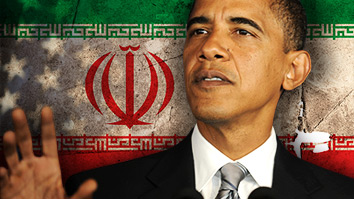Iranians favor diplomatic relations with US but have little trust in Obama
A new WorldPublicOpinion.org poll of Iranians finds that six in 10 favor restoration of diplomatic relations between their country and the United States, a stance that is directly at odds with the position the Iranian government has held for three decades. A similar number favor direct talks.
new WorldPublicOpinion.org poll of Iranians finds that six in 10 favor restoration of diplomatic relations between their country and the United States, a stance that is directly at odds with the position the Iranian government has held for three decades. A similar number favor direct talks.
However, Iranians do not appear to share the international infatuation with Barack Obama. Only 16 percent say that have confidence in him to do the right thing in world affairs. This is lower than any of the 20 countries polled by WPO on this question in the spring. Despite his recent speech in Cairo, where Obama stressed that he respects Islam, only a quarter of Iranians are convinced he does. And three in four (77%) continue to have an unfavorable view of the United States government.
“While the majority of Iranian people are ready to do business with Obama, they show little trust in him,” says Steven Kull, director of WPO. [continued…]
Editor’s Comment — Some of the other poll numbers are striking and indicate how little progress Obama has made in his efforts at public diplomacy aimed at the Middle East.
75% of the Iranians polled believe that the US definitely or probably has the goal of imposing American culture on Muslim society.
81% believe that the US definitely or probably has the goal of weakening and dividing the Islamic world.
85% believe that in the way the US behaves towards the Iranian government it abuses its great power to make Iran do what the US wants.
That last number is one that the US and its allies should keep clearly in mind when they sit down for talks with Iran’s leaders in Istanbul on October 1. The Iranians cannot afford to look like they are getting pushed around and this no doubt explains the source of much of what the West perceives as belligerence.
IAF chief: We must stop S-300 delivery
Israel needs to make every effort to stop the S-300 missile defense system from reaching countries where the air force may need to fly, IAF commander Maj.-Gen. Ido Nehushtan has told The Jerusalem Post in an exclusive interview.
“The S-300 is a Russian-made surface-to-air missile system that is very advanced, with long ranges and many capabilities,” Nehushtan told the Post in the interview, which appears in our Friday Magazine.
“We need to make every effort to stop this system from getting to places where the IAF needs to operate or may need to operate in the future,” he said.
The S-300 is one of the most advanced multi-target antiaircraft missile systems in the world and has a reported ability to track up to 100 targets simultaneously while engaging up to 12 at the same time. It has a range of about 200 km. and can hit targets at altitudes of 90,000 feet.
While Russia and Iran signed a deal for the sale of the system several years ago, according to latest assessments in Israel, it has yet to be delivered. [continued…]
The Grand Ayatollah unleashes his wrath
Small, frail and in his 80s, he looks no match for Iran’s tough regime. But Grand Ayatollah Hossein Ali Montazeri is made of steel. He wields considerable moral authority as the country’s highest-ranking and most fearless dissident cleric, representing a potent challenge to hardline authorities who have tried and failed to silence him for two decades.
He was once Ayatollah Khomeini’s designated successor but was unceremoniously cast aside by the founder of the Islamic Republic, just months before his death in 1989, because the Grand Ayatollah had criticised human rights abuses by the regime. Since then, despite official harassment of his aides and a six-year period of house arrest, Grand Ayatollah Montazeri has remained the outspoken conscience of Iran’s religious community, an advocate of democratic pluralism and foreign policy moderation.
“Montazeri has refused to go away and is today more vocal and explicit in his criticism than ever,” said Anoush Ehteshami, an Iran expert and professor of international relations at Durham University in England. “If anything, his claim that he stands for freedoms and justice are even more important today,” Prof Ehteshami said in an interview. [continued…]
Iran’s Ayatollah Khamenei says opposition protests failed
Supreme leader Ayatollah Ali Khamenei attempted to unify Iranians on Sunday by blaming foreign media for “poisoning the atmosphere” and urged his nation to resist the “killer cancer” of an Israel backed by Western powers.
Delivering a sermon at Tehran University before a crowd that included President Mahmoud Ahmadinejad and opposition cleric Ayatollah Ali Akbar Hashemi Rafsanjani, Khamenei said the West had failed in its attempts to undermine the government with large opposition protests during countrywide anti-Israel rallies Friday.
“It showed that their [Western politicians’] tricks, spending money and political evilness do not influence the Iranian nation,” said Khamenei, who was greeted with chants of “Leader, we offer our blood to you.” [continued…]


Re: the WPO report, is this not a substantial indication that the Iran elections actually went as announced? Furthermore, if western anti Iran strategey falsley assumes that the government is weak, what would be the result?
As Hamid Karzai has demonstrated, the ability to win an election and the willingness to rig the result are not incompatible. In the WPO poll 55% said they voted for Ahmadinejad but only 49% said they would do so again. A quarter of those polled refused to say how they had voted.
But even if Iranians have mixed feelings about their government, their are no indications that they will take kindly to the spectacle of it facing external pressure on the nuclear issue.